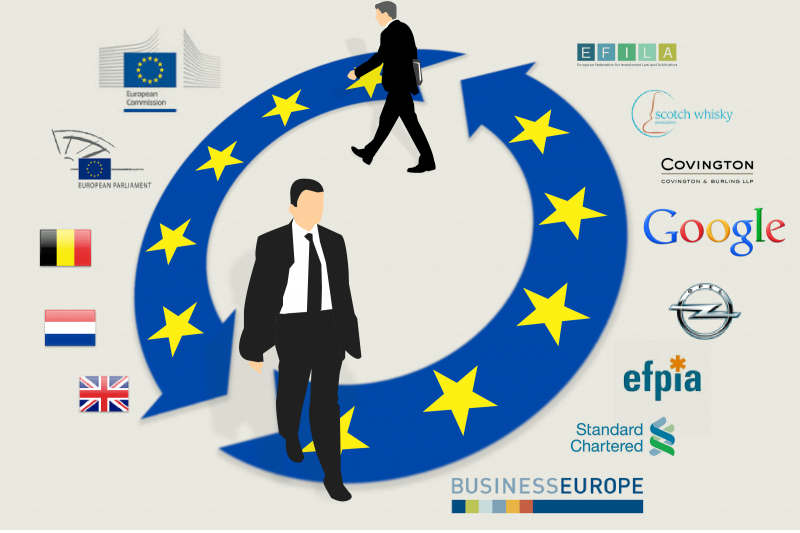
The revolving door: greasing the wheels of the TTIP lobby
The prospective EU-US trade deal TTIP (Transatlantic Trade and Investment Partnership) could be the world's biggest such treaty. While there are disagreements and divergences, in many areas of the negotiations the European Commission is singing from the corporate hymn-sheet. The revolving door between the public and private sectors is helping to grease the wheels of the TTIP corporate lobby. Some of the EU's most senior decision-makers and officials, alongside those from the member state levels, spin through the revolving door into corporate advisor roles; others go in the other direction, from corporate jobs into the public sector. These revolving door cases cover some of the biggest EU corporate lobby sectors, including telecoms and IT issues; food and agriculture; finance; investor-state dispute settlement; pharmaceuticals; regulatory cooperation; and others. This phenomenon creates great potential for conflicts of interest, and demonstrates the synergies between business interests and the European Commission, the UK government, and others when it comes to TTIP and trade negotiations.
Revolving door cases featured in this report
| Name | From | To | |
 | Karl De Gucht | Trade Commissioner | Board of Belgacom? |
 | John Clancy | Spokesman to Trade Commissioner | FTI Consulting |
 | Maria Trallero | DG Trade | European Federation of Pharmaceutical Industries and Associations (EFPIA) |
| Tobias McKenney | DG Internal Market | ||
 | Joao Pacheco | DG Agriculture | Consultancy & Farm Europe |
 | Jan Eric Frydman | Ekenberg & Andersson | DG Trade special adviser |
 | Eoin O'Malley | BusinessEurope | DG Sanco & DG Trade |
 | Holger Krahmer | European Parliament | Hanover & Opel |
 | Silvana Koch-Mehrin | European Parliament | gplus |
 | Nikos Lavranos | Dutch permanent representation | European Federation for Investment Law and Arbitration (EFILA) & Global Investment Protection |
 | Jean De Ruyt | Belgian permanent representation | Covington & Burling |
 | David Frost | UK Department for Business | Scotch Whisky Association |
 | Peter Gooderham | UK Ambassador to WTO | International Chamber of Commerce UK |
 | Thomas Harris | UK Consul General, New York | Standard Chartered Bank & European Services Forum |
 | Neil McMillan | UK Cabinet Office | Consultancy, Amcham EU & EuroCommerce |
Introduction
TTIP, the Transatlantic Trade and Investment Partnership, is one of the biggest games in town right now. As negotiations between the European Union and the United States enter their tenth round of talks in July 2015, TTIP is slated to become the biggest trade deal in the world. It is a major policy priority for the European Commission which claims that the deal will create jobs and boost economic growth. Europe’s biggest businesses have come out united in strong support for TTIP.
Yet many politicians, economists, and civil society groups, including Corporate Europe Observatory, are rather more cynical about the supposed benefits of TTIP. Increased competition could harm Europe’s weaker economies and small and medium enterprises, and cause job losses. Meanwhile, the harmonisation of EU and US laws could drive down existing standards on both sides of the Atlantic, undermining consumer protection, sustainable agriculture, environmental protection, and labour rights.
It is clear that there is a huge lobby battle under-way in Brussels, and indeed in Washington DC too, about what should and should not be included in TTIP and negotiated upon, a battle which CEO has recently documented. Once again, corporate interests' contacts with the European Commission's DG Trade massively outweigh those of NGOs, trade unions, and others representing public interests (DG Trade is mandated by the European Parliament to negotiate this deal on behalf of the European Commission); and our data also identifies which corporate sectors are undertaking the most lobbying.
While there are disagreements and divergences, in many areas of the negotiations DG Trade is singing from the corporate hymn-sheet. Of course, this is not a new phenomenon; CEO's website documents the capture of EU decision-making by big business interests across numerous issues, from finance to fracking. CEO examines how such corporate capture works in practice, and the revolving door, whereby public officials move to work for the private sector, and vice versa, has a significant part to play. Whether it is through the recruitment of seasoned commissioners, officials, or MEPs who take their insider know-how and contact books with them; or moves by individuals to join the EU institutions from corporate interest backgrounds, the revolving door spins easily in Brussels, including in the area of trade and TTIP. In some cases, the risk of a possible conflict of interest is all too apparent.
This report documents a variety of revolving door cases with links to trade and TTIP at the EU but also the member state level. The fact that so many can cross smoothly from the public to private sectors or vice versa, indicates the shared interests and ideologies that can exist. The cases cover a variety of lobby issues including telecoms and IT issues; food and agriculture; finance; investor-state dispute settlement; pharmaceuticals; regulatory cooperation; and others. They raise questions about the effectiveness of revolving door rules (and the way in which they are applied and interpreted) in preventing the risk of conflicts of interest from occurring; we also highlight countries and institutions where revolving door rules are entirely absent.
It has not been possible to conduct a full review of revolving door cases because of the lack of transparency surrounding this legitimate area of public interest: in general it is very difficult to track when officials leave a public institution and take up a new job. The lack of openness by public authorities in terms of who they meet and the information they publicly release on lobby contacts also hampers investigations to map the revolving door and specific lobbying on TTIP.
As a minimum, this report demonstrates the synergies between business interests and the European Commission, the UK government and others when it comes to TTIP and trade negotiations. Whether the revolving door is a cause or an outcome of these synergies is not so easy to determine. But the synergies are there and we believe the revolving door exacerbates the corporate capture of TTIP negotiations.
Of course, the revolving door is not a new issue in the US, the other negotiating side of the proposed trans-Atlantic trade deal, nor is it new in relation to TTIP. In 2014 Stanford McCoy moved from being assistant US Trade Representative for Intellectual Property and Innovation to working for the Motion Picture Association Europe as Senior Vice President and Regional Policy Director. Shaun Donnelly, formerly a US trade official, is now a lobbyist for the US Council for International Business. Matthew Jaffe, a former corporate trade lawyer, is now providing legal advice to the US Trade Representative's office. Meanwhile The Intercept reports that Christopher Wilson, the US Deputy Chief of Mission to the World Trade Organisation, until recently worked for lobbyists C&M International; and Robert Holleyman, the deputy US Trade Representative, previously worked as the President of the Business Software Alliance. To cap it all off, the US Ambassador to the EU, Anthony Luzzatto Gardner has had a long corporate career, most recently working as Executive Director of Bank of America in London and as a Managing Director at Palamon Capital Partners.
These and more eyebrow-raising revolving door cases appear to be commonplace in the US. So what does the TTIP revolving door picture look like in the EU?
The European Commission
 1. Karel De Gucht, from EU trade commissioner to Belgacom board member?
1. Karel De Gucht, from EU trade commissioner to Belgacom board member?
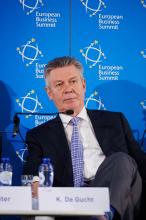 Karel De Gucht was the Commission's head honcho on trade, the EU Trade Commissioner, until the end of the Barroso II Commission in October 2014. De Gucht launched the EU-US trade talks and was seen as an especially controversial Commission figure, considering his push for the inclusion of ISDS (investor-state dispute settlement) provisions in TTIP, despite a huge public outcry. Now, and as profiled on RevolvingDoorWatch, De Gucht has Commission authorisation to join the management board of Belgacom (as well as taking other finance industry roles and academic positions). Belgacom (also operating as Proximus and Skynet) is the biggest telecoms operator in Belgium and over 53 per cent of its shares are owned by the Belgian state.
Karel De Gucht was the Commission's head honcho on trade, the EU Trade Commissioner, until the end of the Barroso II Commission in October 2014. De Gucht launched the EU-US trade talks and was seen as an especially controversial Commission figure, considering his push for the inclusion of ISDS (investor-state dispute settlement) provisions in TTIP, despite a huge public outcry. Now, and as profiled on RevolvingDoorWatch, De Gucht has Commission authorisation to join the management board of Belgacom (as well as taking other finance industry roles and academic positions). Belgacom (also operating as Proximus and Skynet) is the biggest telecoms operator in Belgium and over 53 per cent of its shares are owned by the Belgian state.
Belgacom is a member of the lobby group European Telecommunications Network Operators' Association (ETNO). ETNO and Skynet lobbied EU trade officials on TTIP in meetings behind closed doors when De Gucht was European Trade Commissioner. Skynet was present when DG Trade met with industry representatives to assess their interest in the intellectual property rights chapter of TTIP in April 2013 and in a meeting in July 2013, Commission officials briefed ETNO on the first TTIP negotiation round and promised to “further analyse and discuss internally” ETNO’s position “to identify if new elements should be brought into the negotiations”.
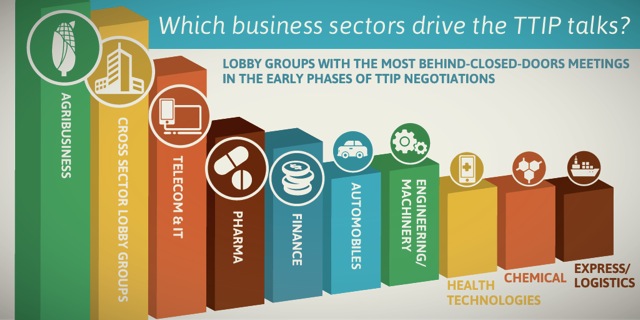
The telecoms/ IT sector is the third biggest lobbyist, after the agribusiness/ food sector and cross-sector business groups lobbying on TTIP in the two years to February 2014, meaning it had the third largest number of behind-closed-doors meeting with DG Trade. In CEO's view, and especially considering the overlapping interests of Belgacom, its lobbying friends and DG Trade, the Commission should not have authorised the appointment of De Gucht to Belgacom. Instead, it gave the green light, as long as he “refrained from lobbying the Commission and / or its departments for eighteen months after leaving the Commission on behalf of Belgacom, and that he protected collective responsibility and confidentiality in respect of matters covered by the Commission during his two terms of office”. At the time of writing (1 July 2015), De Gucht has not yet been officially appointed to the board of Belgacom/ Proximus.
See De Gucht's RevolvingDoorWatch profile.
 2. John Clancy, from De Gucht's spokesman to FTI Consulting
2. John Clancy, from De Gucht's spokesman to FTI Consulting

As the spokesman for former EU Trade Commissioner De Gucht for four years until November 2014, John Clancy put up an aggressive defence of TTIP and other trade negotiations. Yet since De Gucht moved on, Clancy has also departed, joining lobby firm FTI Consulting to specialise in “political communications… bringing extensive experience of issues related to trade, industry and foreign affairs”. Clancy, according to his personal twitter account, remains active on a range of issues including TTIP.
According to the EU lobby register (viewed 1 July 2015), in 2014 FTI had lobby costs of €1,750,000-€1,999,999 and a lobby turnover of more than one million euros. FTI's lobby clients are listed as including fracking company Cuadrilla, Google, Facebook, pharma company Novartis, oil services firm Halliburton, and many others. Trade is included in the list of issues that FTI covers for its lobby clients, although in common with other lobby consultancies, it fails to mention the specific dossiers, like TTIP, that it might be working on. However, CEO has seen an email sent by an FTI Consulting team member to an MEP which lobbies on TTIP on behalf of its client, the International Federation of Inspection Agencies.
EU lobby register
|
Clancy himself told CEO in May 2015: “Since joining FTI Consulting, I have not worked on TTIP on behalf of any clients of FTI Consulting nor had any contact with the European Commission on TTIP.” This would appear to be in line with the Commission's authorisation of his move to FTI which came with the restrictions that “after leaving the service, Mr Clancy will not engage in any direct or indirect lobbying or advocacy activities related to DG TRADE's activities and he will refrain from any professional contacts with DG TRADE staff and the Cabinet of the Commissioner for TRADE.” Yet these restrictions are only in place for six months; other 12 month restrictions placed on him relate to “recent high-profile trade defence investigations” that he was previously involved with. In CEO's view, six month restrictions like this are totally inadequate and ex-Commission staffers should be banned from moving to the EU lobby industry so soon after leaving office.
 3. Maria Trallero, from DG Trade to the European Federation of Pharmaceutical Industries and Associations (EFPIA)
3. Maria Trallero, from DG Trade to the European Federation of Pharmaceutical Industries and Associations (EFPIA)
 Maria Trallero worked in DG TRADE from 2005 to 2012, including on the World Trade Organisation (WTO) and regional trade agreements. Her Linked-in profile says that she has “detailed experience in the formation of EU policy positions and advocacy of EU’s trade interests at the World Trade Organisation (WTO). In-depth understanding of decision-making at EU level, including policy processes, key policy issues and strategic influencing.”
Maria Trallero worked in DG TRADE from 2005 to 2012, including on the World Trade Organisation (WTO) and regional trade agreements. Her Linked-in profile says that she has “detailed experience in the formation of EU policy positions and advocacy of EU’s trade interests at the World Trade Organisation (WTO). In-depth understanding of decision-making at EU level, including policy processes, key policy issues and strategic influencing.”
Now she is the Director of Trade Policy at the European Federation of Pharmaceutical Industries and Associations (EFPIA) in Brussels, one of the pharmaceutical industry's major lobby groups. According to Linked-in she is now responsible for the “development of trade policy strategy for the European research-based pharmaceutical industry and representation of its commercial interests before policy-makers and international stakeholders”.
EFPIA is very active on TTIP, producing numerous briefings extolling the treaty's virtues for the pharmaceutical industry and patients. In February 2015, EFPIA organised a lunch briefing for parliamentary advisors and assistants aimed at “shedding light on widespread misconceptions about the relevance of TTIP to Europe, industry interests, investment protection and regulatory cooperation”. Trallero herself has written about the need to understand the benefits and to dispel the myths about TTIP. Representing EFPIA, she spoke at DG Trade's TTIP event in February 2014, and again in March 2014 where she presented 'TTIP – an opportunity to strengthen the transtlantic pharmaceutical market', and again in July 2014 on the theme of 'TTIP - Fostering innovation and regulatory convergence for the transatlantic pharmaceutical sector'.
EFPIA has been the fifth most prolific lobbyist of DG Trade on TTIP. Between January 2012 and February 2014, CEO research shows that EFPIA had at least 11 meetings on TTIP, with at least ten meetings occuring between April 2013 to November 2014. The anonymised reports of these meetings do not reveal who attended from the industry side. Additional contact came in the form of emails and information exchanges between EFPIA and DG Trade, including with the EU's Chief Negotiator Ignacio Garcia Bercero. In February 2015 alone EFPIA met twice with DG Trade, including with members of the Trade Commissioner's cabinet to discuss TTIP.
EFPIA appears to have significantly upgraded its EU lobby spending in the past year. According to LobbyFacts, for the year 2013 it reported lobby spending of €551,820; for 2014, the EU lobby register figure has increased nine-fold to €5,071,000, making EFPIA one of Brussels' bigger lobby players (viewed 1 July 2015).
While EFPIA works on a range of dossiers as well as TTIP, its massive increase in lobby spending matches CEO's wider finding for Big Pharma and TTIP lobbying. No sector has stepped up its lobbying for TTIP more than Big Pharma which has quadrupled its related spend in recent years. While only 2.4 per cent of the corporate lobbying around TTIP came from Big Pharma in the preparatory phase of the negotiations (January 2012 to March 2013), the sector’s share of lobby encounters with DG Trade jumped to 16.5 per cent of the total in the period after (April 2013 to February 2014).
EFPIA's lobbying makes its agenda for TTIP clear. Along with its sister organisation in the US, it is asking for a pharmaceutical annex to TTIP, to mirror that in trade agreements with Korea. What this means is industry is keen to create a new channel of influence with regulators on both side of the Atlantic which could discuss medicines regulation and pricing; the risk of this could be that it would undermine existing evidence-based approaches to pricing. Big Pharma also have demands in other areas, including on intellectual property rights, which could delay the sale of lower-cost generic medicines.
Surprisingly, the Commission authorised Trallero's move to become a Director of EFPIA in 2013 without applying any restrictions. CEO contacted Trallero via EFPIA but she was away (on maternity leave).
4. Tobias McKenney, from DG Internal Market to Google
 Tobias McKenney worked at the Commission for five years until March 2012 as a Policy Advisor in the Copyright Unit of DG Internal market; since June 2012 he has been European Intellectual Property Manager at Google. He is one of six registered European Parliament lobbyists for Google according to the EU lobby register (viewed 1 July 2015).
Tobias McKenney worked at the Commission for five years until March 2012 as a Policy Advisor in the Copyright Unit of DG Internal market; since June 2012 he has been European Intellectual Property Manager at Google. He is one of six registered European Parliament lobbyists for Google according to the EU lobby register (viewed 1 July 2015).
Most MEPs are not transparent about the lobbyists that they meet but we do know that McKenney met with Amelia Andersdotter MEP and Emma McClarkin MEP in 2013. An assistant of an MEP who is close to Google's issues says its lobbying operations are “low-key, open lobbying indirectly through business coalitions rather than openly as Google… They are also pretty clever on establishing personal relations through events like 'MEPs can test the new Google Glass', or 'Google@6', in informal evening event for EP assistants with free beers, snacks, table-soccer, Guitar Hero and other fun things. They did the latter once a month a while ago... Hard to say how successful this all is, of course, but at the very least if helps them to be heard [sic]”.
This seems a new 'good cop' approach to lobbying, at least in comparison to the past. Politico recently reported on Google's apparent 'bad cop' approach to lobbying, reporting: “More than a dozen members of Parliament, regulators and tech companies interviewed by POLITICO recalled past meetings with the company’s European arm in which they felt belittled and their opinions brushed aside.”
It seems clear that Google is investing heavily in lobbying influence in Brussels. In 2014, Google declared €3,500,000-€3,749,000 on EU lobbying, up substantially from its €1,250,000-€1,500,000 lobby expenditure in 2013 as recorded on LobbyFacts. This is perhaps not surprising; Google has several pressing issues with the European Commission including internet searches, licensing for its Android operating system, and the proposed EU Data Protection regulation. The increased lobby spend may well be paying off. Google ranks only second behind BusinessEurope in terms of the lobbying organisation with the best access to the elite levels of the Commission, according to Integritywatch.eu (viewed 1 July 2015).
And while Google's EU lobby register entry does not specifically list TTIP as a dossier it is working on, it is clear that Google is actively lobbying the Commission on TTIP. According to CEO's data, Google had at least one meeting with DG Trade on TTIP in 2012-13, while Trade Commissioner Cecilia Malmström and her cabinet member Jon Nyman had a meeting with David Drummond (Google's Chief Legal Officer) which included the subject of TTIP, at Davos in January 2015.
According to the meeting notes, “Mr Drummond offered Google's support on TTIP, both as regards contacts with the US Government and other stakeholders. He enquired about progress in EU's negotiations with eg Vietnam and China in opening up data flows.” It seems that Malmström actively encouraged Google to “reassure” MEPs about the TTIP negotiations, perhaps via organising an event. The meeting notes report that: “As regards the TTIP, the negotiations on data had not really started yet given post-NSA [US National Security Agency] concerns, and it would be good if Google and others could reassure stakeholders, eg through a seminar in the EP”.
DG Trade's top official Director-General Jean-Luc Demarty has also met with Google on TTIP via a wider meeting with the lobby group AMISA in February 2014 which brought together various industry representatives. The information in the released document has been redacted, including who specifically attended to represent Google, but it is clear that the issue of intellectual property rights and enforcement under TTIP was raised. Google has also had at least one lobby meeting with DG Trade. All in all, Integritywatch.eu shows that Google had at least 26 meetings with Cabinet members and commissioners from December 2014 to June 2015 (viewed 1 July 2015).
It is not clear to what extent McKenney works on TTIP issues for Google; he did not reply to the questions we put to him. Importantly, he also did not reply to questions about his departure from the Commission. The Commission told CEO in September 2014 that it has no record of any authorisation request from Tobias McKenney to join Google. Commission Secretary General Catherine Day has further told CEO that, “The Commission is currently looking into the matter in order to ascertain whether the rules have been fully complied with in this particular case. This procedure is still ongoing and we are therefore unable to provide any further comments at this point in time.” That was in November 2014; no further information about this case has been received by CEO since then.
Update 20 July 2015: The Commission has now contacted CEO to say: "the procedure related to Mr Tobias McKenney regarding Article 16 of the Staff Relations has been closed without follow-up. It was found that the person concerned had taken the appropriate steps to inform his service of his intentions to engage in the activity in question, and no objections were raised. "
See McKenney's RevolvingDoorWatch profile.
5. Joao Pacheco, from DG Agriculture to private consultancy & Farm Europe
Another former EU official was investigated by the Commission over compliance with the revolving doors rule. Joao Pacheco used to be Deputy Director-General at DG Agriculture before he left a few years ago, when he set up his own consultancy and started to partner with another. CEO raised this problematic revolving door case with the Commission in January 2014; finally in April 2015 we were told that it had taken "the appropriate measure" regarding the former official.
Joao Pacheco was Deputy Director-General at DG Agriculture for over two and half years and was responsible for the management of the Common Agriculture Policy. In 2013 the debate on TTIP was just beginning to hot up. He took part in a seminar on TTIP and agriculture issues.
Soon after, he set up JSPacheco-International Consulting which apparently “provide[s] services to agribusiness firms and associations, dwelling in in-depth experience of European Union Agriculture Policies and Institutions, and International Trade negotiations.” Pacheco's consultancy advertises his former insider know-how very blatantly, offering “a unique set of knowledge, experience and contacts, to provide consulting for agribusiness firms and associations... It offers key contacts to obtain accurate information, and efficiently explain and defend interests.”
The Commission authorised the creation of this consultancy but told Pacheco that he would require prior authorisation on each new consultancy project in the field of agriculture. According to the Commission, no subsequent requests for authorisations for specific projects have been made by Pacheco. At the time of writing (1 July 2015), JSP is not listed in the EU's lobby register and there is no list of clients on the firm's website, though as it states above, it does claim to offer its agribusiness clients expertise in trade and EU agricultural policies.
In October 2013, it appeared that Pacheco had additionally become Director of European Markets at Allen F Johnson & Associates (AFJ), a US-based business and policy consultancy operating with a Brussels' office. This firm is no stranger to the revolving door phenomenon: Allen F Johnson served as the US Chief Agricultural Negotiator at the office of the US trade representative from 2001-05.
The biography for Pacheco listed on the AFJ website makes it abundantly clear why he was hired and it trumpets Pacheco's EU insider credentials: “he has valuable unique experience in dealing with EU internal policies and the inner workings of the European Commission, interacting with the European Parliament and European Council, and working with all the European Union’s member states. Mr. Pacheco’s diverse international experience combined with his in depth knowledge of European affairs and markets provides a valuable perspective that will assist AFJ clients and partners in understanding the market and in addressing market access, subsidy, SPS, food safety, farm and trade policy, technology, and other issues.”
CEO raised concerns about this new role and its potential links with Pacheco's former role at DG Agriculture in January 2014. After its investigations were complete, the Commission told CEO (in April 2015) that: “The Commission subsequently examined the issue and found that the press release gave the impression that Mr Pacheco was recruited by AFJ shortly after his retirement to the position of 'Director of European market', in order to be responsible for matters related to his former position in the Commission, while in reality Mr Pacheco was a partner of AFJ. At the instigation of the Commission, and with the help of Mr Pacheco, the AFJ website has since rectified the information.”
Yet Pacheco's own Linked-in profile, at least until 22 May 2014, also said that he was “Director for European Markets” at AFJ. This has now been amended to say “JSP has partnered with Ambassador Allen F. Johnson AFJ and Associates”. What difference this makes to the Commission's authorisation of this role and presumed decision that no possible conflicts of interest exist is really not clear. The Commission tells us that "There was no evidence that Mr Pacheco had breached the restrictions imposed by the Commission", yet it also says that "By decision of 5 December 2014, the Appointing Authority (ie the Vice-President for the Budget and Human Resources) took the appropriate measure regarding Mr Pacheco, which for data protection reasons cannot be disclosed."
In CEO's view, the Commission's lack of transparency, hiding behind data privacy arguments, makes its decision-making totally untransparent and unaccountable. In July 2015, CEO submitted a complaint to the Commission's Secretary General about the handling of this revolving doors case.
As for AFJ and JSP, according to their websites, they continue to share an identical office address: Level 4, 227 Rue de la Loi, Brussels which, handily, is very close to the Commission's HQ. They also share the same phone number.
And now Pacheco appears to have joined a new initiative, Farm Europe, formally launched on 29 April 2015 in Brussels, which describes itself as “a multicultural think tank that aims to stimulate thinking on rural economies” and “a new forum to connect people interested in a pro-European project for food and agriculture”. It seeks to: “strengthen contacts and informal exchanges with European partners involved in the future of the agri-food sector and who share the same European ambition: farmers organisations, cooperatives, private companies, EU institutions & scientists”. The Farm Europe team, according to its website, comprises various former Commission insiders: Pacheco; Lars Hoelgaard (former Deputy Director General in DG Agriculture and former Special Advisor to the Commissioner for climate action); and Yves Madre (a former Senior Advisor to the Commissioner for agriculture and rural development during the last CAP reform). The Commission appears to have not received any request for authorisation for Pacheco's work at Farm Europe; recently, the Farm Europe website was changed to include the phrase: “Joao is a prominent partner and contributor to Farm Europe”.
Farm Europe is active on TTIP and trade policies more generally. It held a debate in June entitled “Trade: what is at stake for EU agriculture and food sectors”, with a specific focus on TTIP, addressed by DG Trade's Director-General Jean-Luc Demarty and Pacheco, and it has produced a briefing on accessing new markets. Farm Europe says that Pacheco “oversees and stimulates the debate on all the trade related topic”.

Farm Europe has already had two lobby meetings with DG Trade which included discussions on trade and on matters relating to TTIP. The first was between Yves Madre and an undisclosed official; the second was between Madre and DG Trade's director-general Jean-Luc Demarty. Farm Europe's launch event was addressed by Joost Korte, Deputy Director-General of DG Agriculture.
Farm Europe is registered with the EU lobby transparency register. It discloses that four people carry out lobbying activities on its behalf, equivalent to two and a half full-time staff. It does not disclose any funding sources, nor any membership list.
Pacheco has not replied to any of CEO's attempts to contact him.
See Pacheco's RevolvingDoorWatch profile.
It is not just Commission officials exiting via the revolving door to the corporate sector who are greasing the wheels of TTIP; some incoming officials spin through the revolving doors to work on TTIP too.
 6. Jan Eric Frydman, from Commission insider, to transatlantic lawyer and Commission special adviser
6. Jan Eric Frydman, from Commission insider, to transatlantic lawyer and Commission special adviser
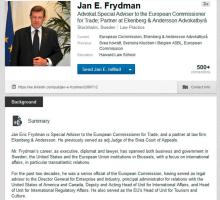 Jan Eric Frydman is a partner in the Swedish law firm Ekenberg & Andersson, where he leads the transatlantic practice. In March, he was appointed Special Adviser for Trade Policy and Transatlantic Affairs to EU Trade Commissioner Cecilia Malmström, a position that grants him extraordinary access to the TTIP negotiations. Frydman holds both of these positions simultaneously, raising serious concerns that the risk of conflict of interests has not been fully assessed.
Jan Eric Frydman is a partner in the Swedish law firm Ekenberg & Andersson, where he leads the transatlantic practice. In March, he was appointed Special Adviser for Trade Policy and Transatlantic Affairs to EU Trade Commissioner Cecilia Malmström, a position that grants him extraordinary access to the TTIP negotiations. Frydman holds both of these positions simultaneously, raising serious concerns that the risk of conflict of interests has not been fully assessed.
Frydman's professional career has been split between law and business, private and public positions. In 1989 Frydman started practising business law at Mannheimer Swartling where he worked with “international transactions and mergers and acquisitions”. Years after Frydman had moved on, Mannheimer Swartling controversially represented Swedish energy giant Vattenfall in an investor-state legal challenge against Germany for its divestment in nuclear energy. Investor-state dispute settlement mechanisms (ISDS) are one of the most controversial aspects of the TTIP negotiations.
In 1996, Frydman made his first spin through the revolving door taking on the position of legal adviser at the European Commission where he was Principal Administrator for relations with the US and Canada (1999-2002), Deputy and Acting Head of Unit for International Affairs (2002-2011) and Head of Unit for International Regulatory Affairs (2011-2012) at DG Enterprise and Industry.
Frydman's time in the Commission gave him detailed insights into trade policy. His CV highlights that he “developed and coordinated among others the instruments and processes that govern the regulatory cooperation for goods between the EU and these countries. In cooperation with the U.S. Trade Representative (USTR), Frydman created the structure for regulatory cooperation between the EU and the U.S., which preceded the ongoing work for a Transatlantic Trade and Investment Partnership (TTIP), and he coordinated with the U.S. Department of Commerce the government side of the Trans-Atlantic Business Dialogue (TABD).”
The TABD (now renamed TABC – Transatlantic Business Council) links business leaders of more than 70 multinationals from both sides of the Atlantic with US cabinet secretaries and European commissioners. TABC's main aim is to reduce barriers to inter-Atlantic trade and for the past 20 years it has been targeting domestic regulations on each side of the Atlantic as “the new obstacles to trade”.
In 2013, Frydman retired from the Commission and went to serve as adjunct judge of the Sva Court of Appeals in Stockholm for eight months. Frydman joined the law Ekenberg & Andersson in 2014. In response to CEO, Frydman describes his work thus: “I work on general civil (ie not criminal) law issues. This means I advise clients on things like contract law (draft or review contracts, for example the sale and purchase of goods or real estate, cooperation agreements, etc), company law, liability issues, international private/family law, pension law, citizenship issues, etc. I also do some EU law, in particular related to the internal market, and also work on human rights law (I specialised in human rights law while at law school). I have particular expertise in transatlantic relations, so I would also be available to advise international clients, including clients in the US, on Swedish law, and also work with clients in France on Swedish law matters as I speak French.”
The law firm's website claims that Frydman “leads the firm's transatlantic practice”; when Frydman was first hired, senior partner Thomas Ekenberg declared that: “With Sweden's membership in the EU, the need for knowledge of EU law and, not least, how the EU institutions work is increasing. Transatlantic relations are also becoming increasingly important. Many decisions affecting Swedish business are taken either in Brussels or in Washington, something that can be expected to continue given the negotiations between the EU and the US on a free trade agreement (TTIP). With Jan's many years of experience in both the EU and the US, our Firm will be able to offer a unique expertise in these areas.”
TTIP negotiations are to a large extent about regulations, both current and future. The regulatory cooperation chapter being negotiated as part of the trade agreement aims to reduce differences in EU and US regulations and is likely to significantly change the way regulations will be decided in the future. Frydman has a clear interest in the topic as evident in an opinion piece published prior to his appointment as special adviser.
Intellectual property rules are another controversial issue in the TTIP negotiations; Frydman's law firm has an “intellectual property practice” (covering patents, trade secrets and other intellectual property rights).
When Frydman was appointed as Special Adviser to Cecilia Malmström, the new Trade Commissioner, the law firm was not slow to see a potential commercial opportunity saying: “We are all glad that Jan, as the only Swedish attorney in such a role, has been appointed Special Advisor to the European Commission. With his vast experience in international trade matters, Jan will support Sweden's EU Commissioner and contribute to the successful implementation of the EU's trade agenda, not least the important negotiations now under way for a Transatlantic Trade and Investment Partnership (TTIP). With continued globalization and increased trade, trade law will become increasingly important, and our Firm is able to offer unique expertise in this area [emphasis added].”
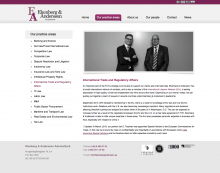 The law firm has posted a footnote to say: “Update: In March, 2015, our partner Jan E. Frydman was appointed Special Adviser to the European Commissioner for Trade. In this role he is bound by rules on confidentiality and impartiality in accordance with European Union rules governing Special Advisers and he therefore does not offer expertise covered by such rules.” CEO is not clear whether this was added before or after after an article was published by CEO which criticised Frydman's appointment.
The law firm has posted a footnote to say: “Update: In March, 2015, our partner Jan E. Frydman was appointed Special Adviser to the European Commissioner for Trade. In this role he is bound by rules on confidentiality and impartiality in accordance with European Union rules governing Special Advisers and he therefore does not offer expertise covered by such rules.” CEO is not clear whether this was added before or after after an article was published by CEO which criticised Frydman's appointment.
In response to CEO's enquiries, Frydman declared that: “I perceive no overlaps at all between what I do at Ekenberg & Andersson and my role as Special Adviser to Commissioner Malmström. … I don't take on lobbying matters. Moreover, our firm only practices Swedish law. The trade, regulatory or transatlantic issues that I would possibly work on would typically involve advising international, including American, clients on Swedish law and Swedish clients on how the legal system works in the US in cooperation with local US counsel, something I used to do when I practised law before I joined the European Commission. I would of course never advise clients on anything that involves what I do or have learnt in my role as Special Adviser to Commissioner Malmström.”
When asked about what areas of expertise he considered to be excluded from his activities as a result, Frydman said that “as I will advising Commissioner Malmström on trade policy and trade relations with the USA, I will not advise any clients on anything that would be a part of such issues.”
In April 2015, CEO wrote a complaint to the Commission's secretary-general Catherine Day arguing that there had not been adequate scrutiny of conflicts of interest in this case, particularly in respect to Frydman's experience in regulatory cooperation issues and how Ekenberg & Andersson have commercial interests in areas covered by the TTIP negotiations. Day's answer did not appease our concerns and instead stated that “the examination of possible conflicts of interest that was carried out in accordance with the Rules on Special Advisers did not reveal any element which would have stood in the way of Mr Frydman's appointment as Special Adviser. It was confirmed by the Head of Cabinet of Commissioner Malmström in the Statement of Assurance that the tasks performed by Mr Frydman in his capacity as Special Adviser will have no link with cases related to his activities as lawyer.”
In CEO's view, the Commission's response to our concerns is highly unsatisfactory. The lack of a comprehensive paper trail strengthens CEO's suspicion that the Commission did not undertake an adequate, proactive, and critical assessment of possible conflicts of interest in this case. CEO considers that there is an inherent conflict of interests between Frydman's position as Head of Ekenberg & Andersson's “EU and transatlantic practice” and his role as Special Adviser for Trade Policy and Transatlantic Affairs. Both Frydman himself and the Secretary-General refer to the rules governing special advisers and to Frydman's declaration of honour as enough protection against possible conflicts of interest. In our opinion, this is unconvincing as the rules are ambiguous and unclear and do not specify which activities are off-limits. Even if Frydman had removed himself from a wide range of clearly defined areas of work within Ekenberg & Andersson, his role as partner at Ekenberg & Andersson would still give rise to potential conflicts of interest, as his advice could be biased towards the wider financial interests of this company. The Commission should be more thorough when appointing special advisers and it should put far stronger safeguards in place to prevent possible conflicts of interests.
See Frydman's RevolvingDoorWatch profile.
 7. Eoin O'Malley, from BusinessEurope to the European Commission
7. Eoin O'Malley, from BusinessEurope to the European Commission
Eoin O'Malley, who used to be a Senior Adviser on International Relations at BusinessEurope, the umbrella group for corporate interests, is now a policy officer and speech writer at DG Trade. O'Malley initially joined DG SANCO in June 2010 to work on consumer safety from BusinessEurope, and later moved to DG Trade in February 2012 where he works as a speech-writer and as part of the trade strategy team at DG Trade. The Commission has refused to release any speeches or policy documents worked upon by O'Malley.
In March 2015, O'Malley was advertised as the “policy officer in charge of SMEs” at an event called: The impact of TTIP in Malta: Benefits a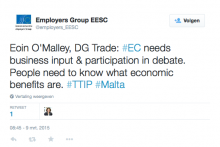 nd challenges organised by the Malta Chamber of Commerce and the Employers' Group of the European Economic and Social Committee. The latter's twitter account reported on O'Malley's speech saying: “Eoin O'Malley, DG Trade: #EC needs business input & participation in debate. People need to know what economic benefits are. #TTIP #Malta”.
nd challenges organised by the Malta Chamber of Commerce and the Employers' Group of the European Economic and Social Committee. The latter's twitter account reported on O'Malley's speech saying: “Eoin O'Malley, DG Trade: #EC needs business input & participation in debate. People need to know what economic benefits are. #TTIP #Malta”.
For the four years to June 2010, O'Malley worked at BusinessEurope as a Senior Adviser on International Relations. BusinessEurope is one of Brussels' biggest and most influential lobby groups; it registers 23 European Parliament access pass holders and lobby expenditure of €4,000,000 - €4,249,999 for 2014 according to the EU's transparency register (viewed 1 July 2015).
BusinessEurope has substantial interests in the work of DG Trade, including in TTIP. In fact BusinessEurope has been the most prolific EU lobbyist on DG Trade with regards to TTIP, according to data produced by CEO covering the period January 2012 to February 2014. In these two years, it had 15 meetings with DG Trade officials, attended civil society dialogues and submitted formal letters and position papers.
As well as work on specific sectors, BusinessEurope has been at the forefront of promoting the 'regulatory cooperation' agenda which would give business a pivotal role in preparations for new regulation. BusinessEurope's ambition (developed in conjunction with the US Chamber of Commerce) was to make sure business would, “essentially co-write regulation” through a process “oriented to allow stakeholders as well as regulators to identify entire sectors and regulations within sectors that are potentially ripe for an equivalence evaluation” ie. not having one side with stricter regulations than the other. Regulatory cooperation is one of the most controversial aspects of TTIP and could affect the rules affecting food safety, the environment, finance and other important areas.
BusinessEurope's lobbying has paid off; its regulatory cooperation proposal has been largely adopted by the Commission.
According to data released to CEO under access to documents, O'Malley has had some contact with BusinessEurope whilst at the Commission, including being invited to a leaving do of a former BusinessEurope colleague. CEO contacted O'Malley; an official at DG Trade replied on his behalf to say “we've no particular elements to contribute by way of response to your questions in relation to individual situations”.
The Commission has told CEO that it has no documents which indicate that Eoin O'Malley underwent an assessment of personal interests when he joined the Commission. In fact, since he joined the Commission, the revolving door rules for incoming staff have been tightened and now all new staffers must undergo a conflict of interest assessment. This revolving door case illustrates the ideological closeness between the major corporate lobbyist BusinessEurope and the Commission, when staff can move from one organisation to the other without anyone, apparently, batting an eyelid.
See O'Malley's RevolvingDoorWatch profile.
The European Parliament
The TTIP battle is being hard-fought in the European Parliament too. How handy then, to have a former MEP or two lobbying on your behalf. CEO has written extensively about the revolving door problem of departing MEPs moving into lobby jobs; several new cases, reported below, have links to TTIP. Shockingly the European Parliament has next-to-no rules governing the revolving door, despite the fact that when MEPs leave they are entitled to a generous transitional allowance equivalent to one month's salary for every year they have been an MEP.
 1. Holger Krahmer, from the European Parliament to lobbying for Opel and General Motors
1. Holger Krahmer, from the European Parliament to lobbying for Opel and General Motors
Holger Krahmer was a German liberal MEP for ten years until 2014. A few months after leaving the Parliament, Krahmer started working for the consultancy firm Hanover Communication where he worked for six months as a senior adviser on EU policy. For 2014, according to the EU lobby register (viewed 1 July 2015), Hanover declared lobby turnover of €500,000 - €999,999 and refers to TTIP as one of its main EU interests. Clients include Anglo American, biotech lobby group EuropaBio, and others with a likely interest in TTIP.
In April 2015, Krahmer started working for Opel Group, the European branch of General Motors (GM), as Director of European Affairs, Public Policy and Government Relations. There is very little public information about his appointment but media reports explain that Krahmer will work with all GM brands and that this is a new position.
Opel is a German car-maker, owned by GM. Opel Group, including Vauxhall, is now the third most sold brand in Europe in 2014 and Opel Group is responsible for representing all GM interests in Europe. According to its lobby register declaration, in 2014 Opel spent between €900,000 – €999,999 lobbying the European institutions (viewed 1 July 2015).
While an MEP, Krahmer worked extensively on the auto industry. Most notably, he was the rapporteur for CO2 emissions levels on light commercial vehicles. His report was criticised by civil society organisations and small business associations but was welcomed by the European Automobile Manufacturers Associations (ACEA), of which Opel is a member.
In Opel's EU lobby register entry, bilateral trade negotiations such as TTIP are listed as a priority topic. While an MEP, Krahmer worked on several regulatory requirements for the auto industry, experience likely to be useful for Opel. As a subsidiary of GM, Opel's interest lies in the uniformisation of regulatory standards, including safety features and crash testing; talks on auto safety within TTIP is an issue that has caused concern among consumer groups who fear a lowering of standards.
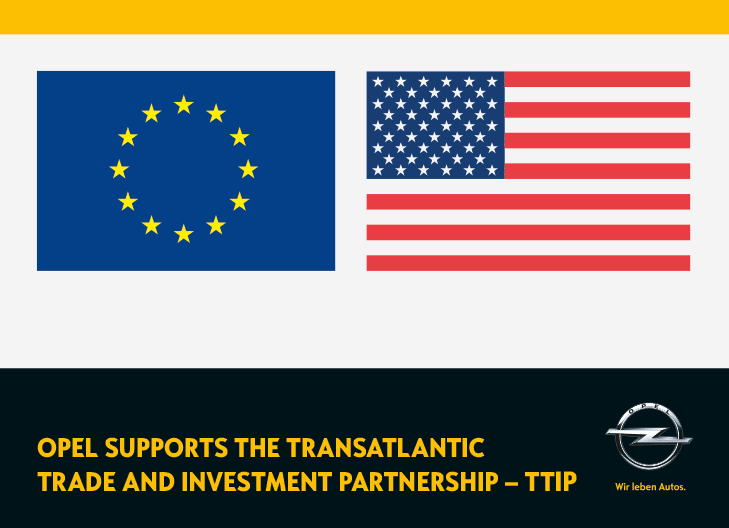
Opel/ GM has been particularly active in lobbying both the EU and US on TTIP. It held a lobby meeting in December 2014 with members of Commissioner Malmström's cabinet on the issue. In Europe, Opel's position is re-enforced by its membership of associations such as the American Chamber of Commerce EU (AmCham EU), the British Chamber of Commerce, the Verband der Automobilindustrie (German automobile industry association), BusinessEurope and the European Automobile Manufacturers' Association (ACEA). CEO's data shows that the ACEA is the fourth most prolific lobbyist of DG Trade on TTIP with at least 12 lobby meetings held from January 2012 to February 2014. The ACEA has also been active in lobbying MEPs on TTIP.
When contacted by CEO, Krahmer defended his new positions saying: “As you know, I finished the parliamentary mandate at july 1st 2014. Nine months after finishing the mandate, i started working for Adam Opel AG. It is not in question, that Opel and myself did and does respect the existing laws and the EU-Institution Rules. Same is valid for hanover. [sic]”
On 9 May, Opel added Krahmer to its list of lobbyists with Parliament accreditation. There are next to no rules in the European Parliament to tackle the risk of conflicts of interest arising from revolving door moves.
Read Krahmer's RevolvingDoorWatch profile.
 2. Silvana Koch-Mehrin, from the European Parliament to lobby firm gplus
2. Silvana Koch-Mehrin, from the European Parliament to lobby firm gplus
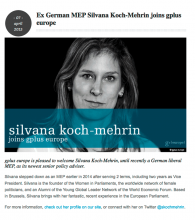 Silvana Koch-Mehrin is another German liberal who was an MEP for 10 years until 2014, including Vice-President of the liberal democrat (ALDE) group for five years.
Silvana Koch-Mehrin is another German liberal who was an MEP for 10 years until 2014, including Vice-President of the liberal democrat (ALDE) group for five years.
Indeed, Koch-Mehrin was particularly active on trade issues, especially with Russia and Canada. She published several reports, mostly as a shadow rapporteur, dealing with Russian exports of raw materials, wood products, and steel products. But she also worked on the EU-Canada trade agreement, CETA, including via parliamentary questions and also publishing opinion pieces where she defended the trade agreement.
Importantly, she was also the shadow rapporteur for the proposal establishing a framework for financial responsibility in investor-state dispute settlements (ISDS) within EU's trade agreements. This report established in which cases financial responsibility fell to the EU institutions or to member states individually. ISDS is one of the most controversial aspects of the TTIP talks but it is also included in CETA.
In November 2014, the public affairs and communications company, gplus europe recruited Koch-Mehrin to serve as Senior Policy Adviser. In April the firm released a short statement saying: “gplus europe is pleased to welcome Silvana Koch-Mehrin, until recently a German liberal MEP, as its newest senior policy adviser.… Based in Brussels, Silvana brings with her fantastic, recent experience in the European Parliament.”
The public affairs company actually boasts of hiring staff through the revolving door claiming that: “Our staff stems from diverse backgrounds having held senior posts in and around the EU institutions, Brussels media and interest groups, which enables us to offer our clients informed and fresh strategic thinking and excellent networks in Brussels and Strasbourg.”
In its lobby register entry (viewed 1 July 2015), gplus lists a wide array of EU issues that it has experience in (“energy, healthcare, financial services, digital, data protection, taxation, agriculture, transport, fisheries, antitrust and trade”) although it only mentions one specific initiative.
In 2014, the firm reportedly spent between €3,000,000 and €3,249,999 in lobbying activities in Brussels. Its biggest client is Archer-Daniels-Midland Company, an American food processing and commodities trading company, which bring gplus an annual lobby revenue of between €300,000 and €399,999. In a lower revenue bracket (€100,000-€199,999), others paying for gplus' lobbying services include: the European Federation of Pharmaceutical Industries and Associations (EFPIA), Qualcomm (the US IT firm), the Motion Picture Association, and a coalition of “non-European companies involved in chemical production and trade with the EU”, among others.
Several of gplus' clients have keen interests in ongoing trade negotiations, such as TTIP. Qualcomm has had several meetings with the Commissioner's cabinet staff on intellectual property issues in China, and on patents and standards in the ICT sector. Similarly, according to Intergritywatch.eu EFPIA has met several times with her senior staff to discuss TTIP specifically in the six months to May 2015. gplus itself has participated in TTIP stakeholder events.
In response to CEO, Koch-Mehrin declared that: “Firstly, I have decided to take on the role of senior policy advisor at gplus europe following a thorough reflection beforehand. Just to be clear – the role of Senior Policy advisor is not a day to day regular client serving position in the company. My activities are limited to occasional strategic advice as and when required. I chose to join gplus as it is a well established and respected company in the market place and they work fully transparently. During my time as an MEP I had very limited contacts with gplus europe and as you will be aware my record as a member of the European parliament is available and can be consulted at any time. I see absolutely no conflict of interest as regards my past role and what I am doing at this time.”
See Koch-Mehrin's RevolvingDoorWatch profile.
The EU member states
The revolving door is not exclusive to the European Commission and the Parliament, and while it has not been possible to assess how the revolving door affects TTIP in each of the 28 EU member states, some particularly striking cases have come to light.
 1. Nikos Lavranos, from the Dutch permanent representation, to the European Federation for Investment Law and Arbitration (EFILA)
1. Nikos Lavranos, from the Dutch permanent representation, to the European Federation for Investment Law and Arbitration (EFILA)
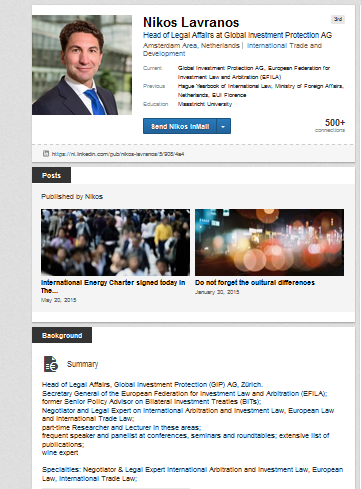 Until July 2014, according to his Linked-in profile, Dr Nikos Lavranos was working for the Dutch government as a senior policy advisor on bilateral investment treaties, workign at the EU level. He is an expert on international arbitration and investment law. He worked for the Dutch government for more than four years and he led the negotiations for several investment treaties; he was also the chief Dutch representative in the EU’s trade policy committee.
Until July 2014, according to his Linked-in profile, Dr Nikos Lavranos was working for the Dutch government as a senior policy advisor on bilateral investment treaties, workign at the EU level. He is an expert on international arbitration and investment law. He worked for the Dutch government for more than four years and he led the negotiations for several investment treaties; he was also the chief Dutch representative in the EU’s trade policy committee.
NGOs, including Transnational Institute and CEO, recently reported that Dutch investment treaties, which Lavranos helped to negotiate, are generally considered as some of the most investor-friendly in Europe. In conjunction with its company-friendly tax regime, the vaguely-worded investment treaties are the reason why the Netherlands ranks second worldwide in originating arbitration claims.
In July 2014 in Brussels, the European Federation for Investment Law and Arbitration (EFILA) was launched which aims to be the "main voice" of users of investment arbitration at the EU level. Lavranos co-founded EFILA and is the Secretary General of the organisation which also includes law firms representing some of Europe's biggest companies.
The setting-up of EFILA is a direct response to recent hard-hitting criticisms (including from CEO, MEPs and some member state governments) of the Commission's proposals to include investor state dispute settlement (ISDS) provisions within TTIP. In a recent Commission consultation on the issue of ISDS in TTIP, the institution was overwhelmed to receive 150,000 objections representing 97 per cent of the total, an indication of the strong public concern on this matter.
Lavranos is quoted as saying: "We became increasingly annoyed that there were so many lies and half-truths and propaganda out there and no counterbalance. We felt there was a clear need for investment arbitration practitioners to pool their expertise and explain to the public the benefits of investor-state arbitration". He also said: "Nobody argues that the current investment arbitration system is perfect.… There is no doubt that the system has to evolve if it wants to survive. But we believe that most, if not all, of the critique is highly exaggerated and based on wrong perceptions."
EFILA has joined the EU lobby register, declaring less than €9,999 lobby expenditure for the six months to November 2014 (viewed 2 July 2015). It lists four lobbyists registered with the European Parliament, including Lavranos, and identifies TTIP as one of the dossiers it currently lobbies on. It has had at least one meeting with the Commission to discuss ISDS, in October 2014.
EFILA also has an advisory board which brings together representatives from law firms, major companies such as Shell, and from governments. EFILA says that they “serve in their personal capacity and shall be completely independent from the organisations in which they are employed or hold mandates”. The recent NGO report Lawyers subverting the public interest provides additional information on their backgrounds.
In September 2014, Lavranos also joined Global Investment Protection in Zürich as Head of Legal Affairs. The consultancy advises companies in how to structure investments to have access to the most investor-friendly arbitration routes in case of “unreasonable governmental action” such as “regulatory and tax measures”. Other services of the company include “pre-emptive lobbying and intervention” and developing funding strategies for investor-state claims. Global Investment Protection commented on the appointment that “[with] Nikos Lavranos in our team we can offer investors hands-on knowledge on how to defend [investor assets] against destructive government interventions.”
It seems clear that Lavranos has seamlessly walked from a key position with the Dutch government negotiating ISDS provisions in trade deals, now one of the hottest topics in the whole TTIP negotiation, through the revolving door to lobby, on behalf of private interests, on identical ISDS issues at the EU level. The Dutch government needs to urgently develop some tough revolving door rules to prevent future moves like this which raise the strong risk of possible conflicts of interest. Lavranos declined to respond to our questions.
Read Lavranos' RevolvingDoorWatch profile.
 2. Jean De Ruyt, from the Belgian permanent representation to Covington & Burling
2. Jean De Ruyt, from the Belgian permanent representation to Covington & Burling
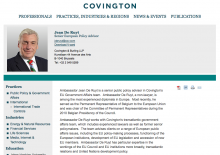 Jean De Ruyt is a former Belgian diplomat. He was Belgium's permanent representative to the EU and chair of the committee of permanent representatives during the 2010 Belgian presidency of the Council. He then spent four months until January 2012 working as special envoy to Catherine Ashton, the EU's then-High Representative for Foreign Affairs. In a long career, he was also the Permanent Representative of Belgium to the UN, to NATO and also Deputy Chief of Mission in Washington for 14 years.
Jean De Ruyt is a former Belgian diplomat. He was Belgium's permanent representative to the EU and chair of the committee of permanent representatives during the 2010 Belgian presidency of the Council. He then spent four months until January 2012 working as special envoy to Catherine Ashton, the EU's then-High Representative for Foreign Affairs. In a long career, he was also the Permanent Representative of Belgium to the UN, to NATO and also Deputy Chief of Mission in Washington for 14 years.
Following his retirement from diplomatic circles, De Ruyt joined Covington & Burling LLP, an international law firm with a major office in Brussels. According to Covington's website, they “ensure that industry’s voice is heard in the EU legislative process and in administrative decision making”. And as Covington's Peter Bogaert said at the time of De Ruyt's appointment: “Jean is a tremendous addition to Covington’s existing government affairs capabilities in Europe and internationally. His knowledge of the European institutions and the complex interplay between EU, U.N. and U.S. policies and his strategic insights on complex matters are second to none and we are confident his arrival will significantly support our legal team and will be welcomed by many of our clients.”
Covington's on-line profile of De Ruyt champions his insider knowledge and states that he is part of “Covington's transatlantic government affairs team,” advising clients “on a range of European public affairs issues, including the EU policy-making processes, functioning of the European institutions, development of EU legislation and accession of new EU members.” Elsewhere, Covington makes clear that De Ruyt is a member of Covington's TTIP trade team, together with other members of the Brussels and Washington offices, almost all of who have formerly come through revolving doors from the highest levels. Covington is actively pitching for clients on TTIP, producing blogs and speeches on the topic.
Covington (very belatedly) joined the voluntary EU lobby register in May 2015, declaring the equivalent of seven full-time lobbyists and an annual lobby turnover of more than €1,000,000 for the year to September 2014 (viewed 1 July 2015). Clients include Microsoft and many from Big Pharma including the EFPIA. Covington does not mention TTIP in its lobby registration as an issue that it is following; nor did it respond to CEO's 2014 survey of law firms and lobby consultancies about its work on TTIP. De Ruyt also did not answer questions put to him direct by CEO. Nonetheless, he did speak to the New York Times in October 2013 in an article which looked at the growth of US law firms lobbying in Brussels.
The NYT reported on a lobby strategy session at Covington's Brussels' office “where four lobbyists discussed plans with a partner to try to influence debates on trade negotiations, data privacy and pharmaceuticals... Mr. De Ruyt shared with the team the close ties he has with the new United States ambassador to the European Union — a relationship sure to come in handy as new client matters emerge.” De Ruyt was reported as saying he had learned the art of influencing decisions, instead of just making them: “There is a certain excitement of getting what you want through the system. I now know exactly how to do it.”
De Ruyt is also on the “Board of Counselors and Senior Advisor, Europe & Eurasia Practice” of McLarty Associates. McLarty is a group of “former diplomats, trade negotiators, intelligence officers, journalists, and business people” who “work to analyze the international opportunity or problem, assess the tools available to the client, develop the strategy, and execute it – all in close coordination with the client”.
The career of De Ruyt represents a classic Brussels revolving doors move: a seasoned diplomat after decades of public services at the elite level, moves into the private sector and uses his reputation, insider know-how and policy insights to aide private sector interests. For trans-Atlantic law firms such as Covington, TTIP represents a huge opportunity and De Ruyt's background makes him an ideal front man.
Read De Ruyt's RevolvingDoorWatch profile.
The UK is another EU member state with a fast-spinning revolving door between official circles and the pro-TTIP lobby. UK business is also heavily lobbying on TTIP, at both the EU and national levels.
 3. David Frost, from the UK government to the Scotch Whisky Association
3. David Frost, from the UK government to the Scotch Whisky Association
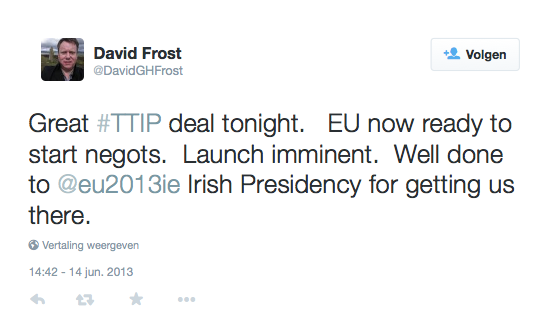 David Frost spent 25 years in the UK's diplomatic service, including as Ambassador to Denmark. Latterly he was Director for Europe, Trade, and International at the UK's Department for Business, Innovation and Skills (which leads on trade policy) until November 2013 where, according to his Linked-in profile, he “delivered better results for UK business through more vigorous UK commercial, trade, and EU single market policy”. According to the Powerbase database of UK PR watchdog Spinwatch, Frost was “involved in getting European countries to all agree to proceed on TTIP negotiations with the US”. His personal twitter account backs that up, showing lots of pro-TTIP tweets including: “Great #TTIP deal tonight. EU now ready to start negots. Launch imminent. Well done to @eu2013ie Irish Presidency for getting us there.”
David Frost spent 25 years in the UK's diplomatic service, including as Ambassador to Denmark. Latterly he was Director for Europe, Trade, and International at the UK's Department for Business, Innovation and Skills (which leads on trade policy) until November 2013 where, according to his Linked-in profile, he “delivered better results for UK business through more vigorous UK commercial, trade, and EU single market policy”. According to the Powerbase database of UK PR watchdog Spinwatch, Frost was “involved in getting European countries to all agree to proceed on TTIP negotiations with the US”. His personal twitter account backs that up, showing lots of pro-TTIP tweets including: “Great #TTIP deal tonight. EU now ready to start negots. Launch imminent. Well done to @eu2013ie Irish Presidency for getting us there.”
In September 2013 it was announced that Frost would join the Scotch Whisky Association (SWA), the trade association promoting the drink that accounts for “a quarter of UK food and drink exports”. He started at the SWA in January 2014. This raises several questions including what responsibilities Frost held for trade issues pertinent to the SWA, especially in his final few months. Frost has not replied to CEO's questions on this and related matters. But as Spinwatch's David Miller has written: “Public servants like Frost are supposed to defend the public interest. Close involvement in a trade deal which will significantly benefit industries such as whisky shows that this problem is not only a matter of post-employment, but also the structure of public service. It’s time that better monitoring and management of apparent conflicts of interest – at both national and EU level – should begin.”
The SWA is registered with the EU lobby register and for 2014 it records lobby expenditure of €700,000 - €799,999 (viewed 2 July 2015). According to an article on LobbyFacts from January 2015, the SWA was the third biggest UK trade association lobbyist on EU affairs. It is a member of SpiritsEurope, the EU-wide trade lobby association and they jointly attended a lobby meeting with two members of the cabinet of trade commissioner Cecilia Malmström in February 2015 to discuss “various ongoing trade negotiations”. SpiritsEurope has had at least one other meeting with senior members of the Commission since December 2014 on trade.
The SWA is very pro-TTIP and is a member of the UK government's core TTIP stakeholder group. In particular, the SWA sees TTIP delivering precedents for future trade deals, including in the area of regulatory convergence and investor-state dispute settlement. In a June 2014 speech delivered in Brussels, Frost told then-Trade Commissioner Karel De Gucht: “There could be more creativity in trade negotiations. The EU/US TTIP is potentially an excellent example here, with the proposed Spirits Drinks Annex to set out best regulatory practice as an example to others. Moreover, the TTIP will enshrine the Commission's excellent idea of a “living agreement”, ie providing a framework to negotiate issues that don't make it into the initial deal. This too could be a model. With our biggest partners, we could aim at continuous negotiating processes providing periodic agreements, rather than big bang deals. This would mean that sectors not in an initial agreement could still look forward to the prospect of liberalisation, rather than, as now, losing it for a generation.”
This is exactly what anti-TTIP campaigners are concerned about, that TTIP will introduce new forms of deep regulatory convergence, now and into the future, and in processes which are outside of democratic accountability.
Frost's move to the SWA was authorised by the UK government; it refused to release the relevant documents to CEO but told us that “Mr Frost’s appointment complied with the rules on Business Appointments which are set by the Cabinet Office”.
 4. Peter Gooderham, from the UK government to the International Chamber of Commerce UK
4. Peter Gooderham, from the UK government to the International Chamber of Commerce UK
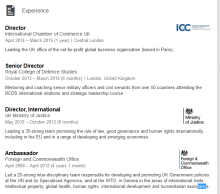 Peter Gooderham joined the International Chamber of Commerce UK (ICC UK) as Director in April 2014, following an almost 30 year career as a British diplomat. He was UK ambassador to the UN and WTO in Geneva until 2012 where, according to his linked-in profile, he “led a 25-strong inter-disciplinary team responsible for developing and promoting UK Government policies at the UN and its Specialised Agencies, and at the WTO, in Geneva in the areas of international trade, intellectual property, global health, human rights, international development and humanitarian assistance.”
Peter Gooderham joined the International Chamber of Commerce UK (ICC UK) as Director in April 2014, following an almost 30 year career as a British diplomat. He was UK ambassador to the UN and WTO in Geneva until 2012 where, according to his linked-in profile, he “led a 25-strong inter-disciplinary team responsible for developing and promoting UK Government policies at the UN and its Specialised Agencies, and at the WTO, in Geneva in the areas of international trade, intellectual property, global health, human rights, international development and humanitarian assistance.”
The ICC UK calls itself “the voice of international business in the UK. We aim to further our members’ interests by making it easier for them to trade internationally. We do this by working with governments and businesses worldwide to open up markets, establish a level playing field for enterprise, and promote sensible regulation.”
The ICC UK has had at least one meeting with Commissioner Malmström's office since November 2014 on TTIP. However, the ICC UK is not registered in the EU as a lobbyist in the lobby transparency register, although the parent organisation the ICC is. It registers a lobby expenditure of €10,000 - €24,999 in 2014, implying that it is not a major EU lobbyist (viewed 1 July 2015).
However, at the UK level, the ICC has been very active, especially on the topic of TTIP. The UK's key trade promotion department (Business, Innovation and Skills or BIS) reports that two meetings were held between then minister Lord Livingston (who himself went through the revolving door from the major UK telecoms group BT where he was chief executive to become UK trade minister in 2013) and the ICC in the year to March 2015 on TTIP. The first was an update meeting with the minister, officials and three business organisations, including the ICC where Lord Livingston welcomed the engagement of the organisations on the public debate on TTIP. The second was the TTIP Cross-Whitehall Action Group Meeting in January 2015 where three representatives from ICC UK attended alongside GSK, Shell and others. At the meeting, the ICC apparently agreed to “follow up on getting business to speak up for TTIP”.
But these are just some of the interactions between the ICC and the UK government's trade team on TTIP. ICC is a member of the UK government's core stakeholder group on TTIP and has attended government-organised roundtables looking at TTIP in relation to specific sectors. At one point the ICC told the UK government, in a pitch to entice a minister to attend a proposed lunch event: “We’ve done a lot of work in the TTIP space – most notably on investment protection in recent months – and would see the lunch as an opportunity to engage the leadership of some key businesses in pushing for a successful deal in the year ahead. As you might be aware, we worked with No 10 [UK prime minister's office] early last year to put out some pieces in support of launching the negotiations (see e.g. the attached). We are keen to look at how we can engage to similar effect going forward. I think there would also be interest in discussion broader trade policy issues (esp WTO); as well as concerns about the supply of finance to support trade. But I’d see these two as secondary points to TTIP.”
The ICC held an event entitled Investor-state dispute settlement – towards a European model? in September 2014 with Frank Hoffmeister (deputy head of De Gucht's cabinet in the European Commission) who delivered a keynote speech providing a “view from Brussels” on the current ISDS debate.
It is clear that the ICC UK has been heavily lobbying the UK government on TTIP. What is not clear is the exact role, if any, of its director, Peter Gooderham. All documents released to CEO under freedom of information rules had specific lobbyist names redacted so it is not possible to know who from ICC UK was authoring emails and attending meetings. The UK Government told CEO that the Advisory Council on Business Appointments did not scrutinise this job move as Gooderham was too junior; his last UK government department did not scrutinise it either.
Gooderham left the ICC UK in March 2015 and did not reply to our questions so we are none the wiser. He has now been replaced at ICC UK by Chris Southworth who, according to his Linked-in profile, used to work at UK Trade and Investment, heading-up the UK government's £20million global campaign “to strengthen the role and competitiveness of the UKs overseas business network and create an accredited international UK business network for the first time”. Plus ça change!
 5. Thomas Harris, from the UK government to Standard Chartered Bank and the European Services Forum
5. Thomas Harris, from the UK government to Standard Chartered Bank and the European Services Forum
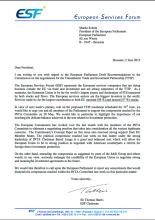 Thomas Harris was a very senior diplomat and UK government official; specifically he was responsible for export promotion at the Department for Trade and Industry, he led on promoting UK trade and investment in the US, and was the UK's Consul General in New York until 2004. At that point he joined Standard Chartered Bank as Vice Chairman. His move was authorised by the UK Government on the condition that, “for six months from his last day of service, he should not visit the USA for commercial purposes, give advice on it, or have dealings with companies there”.
Thomas Harris was a very senior diplomat and UK government official; specifically he was responsible for export promotion at the Department for Trade and Industry, he led on promoting UK trade and investment in the US, and was the UK's Consul General in New York until 2004. At that point he joined Standard Chartered Bank as Vice Chairman. His move was authorised by the UK Government on the condition that, “for six months from his last day of service, he should not visit the USA for commercial purposes, give advice on it, or have dealings with companies there”.
According to Debretts, Harris is or has been on the board of a range of other corporations as a non-Executive Director: Standard Chartered Bank Korea since 2007; Johnson Matthey plc 2009-12; City UK plc since 2010, and others.
While at Standard Chartered, Harris spoke at the International Chamber of Commerce UK event “Investor-state dispute settlement – towards a European model?”. Former Trade Minister Lord Livingston met with Standard Chartered in March 2014 about trade and investment.
Harris has now left Standard Chartered and is chairman of the European Services Forum (ESF). The ESF is one of Brussels' most well-connected lobbying trade associations and according to CEO's data it was the sixth most prolific lobbyist on TTIP in the two years to February 2014, holding at least 11 direct lobby meetings with DG Trade officials. ESF's managing director Pascal Kerneis sits on the European Commission's TTIP advisory group. A letter, sent by the ESF in February 2014 and signed by Harris, to both Commissioner De Gucht and US ambassador Froman is typical of ESF's lobbying on TTIP, demanding TTIP negotiations proceed “at high speed and with high ambition”. The Commission's TTIP negotiators regularly attend ESF's policy committee to brief members on the latest state of play. ESF also lobbied MEPs, including European Parliament President Martin Schulz on the plenary vote on TTIP in early June (a vote which was subsequently postponed to July). Harris declined to answer our questions.
Standard Chartered and TTIPStandard Chartered's TTIP lobbying continues apace and it is firmly in the pro-TTIP camp. Its EU work on TTIP is headed-up by Edward Bowles, the Regional Head of corporate and public affairs in Europe for the bank. Like Kerneis, he also sits on the European Commission's TTIP advisory group and judging by the documents released to CEO by the Commission under access to documents, he is in regular email contact with trade negotiation officials, including Chief Negotiator Ignacio Garcia Bercero. Bowles has also addressed the European Parliament's economic and monetary affairs committee on TTIP and financial services, arguing for the inclusion of financial services regulation within the deal. This could mean that whenever a law on finance is planned in the US or in the EU, it will first be discussed between unelected officials. And according to the EU's current proposal, no new rules must harm the interests of “market operators”, eg banks or hedge funds, from the other side of the Atlantic. The proposal is designed to allow EU banks and insurance companies to also be able to follow EU laws (less stringent than US laws) in the US and vice versa. This could easily result in standards dropping to the lowest common denominator and could prevent either party from introducing rules necessary to avoid a financial meltdown such as the one which occurred in 2008. Bowles told CEO: “I believe that we all have a contribution to make to the debate on TTIP, to make sure that it is fit for purpose. My contributions draw on my experience and knowledge, not only of financial services but trade generally”. He also told CEO that he was appointed to the Commission's TTIP advisory group "in a personal capacity and act accordingly". CEO has long criticised the Commission's approach to its expert groups including its habit of appointing those with corporate backgrounds to act 'independently'. Bowles was a UK government official, latterly Private Secretary to the Permanent Secretary at the UK Ministry of Justice, until he moved to Standard Chartered in 2007. Standard Chartered is in the EU lobby register with a lobby spend of €300,000 in the year to March 2015 (viewed 2 July 2015). Its “person in charge of EU relations” is Gergely Polner who used to be Head of Public Affairs for the European Parliament in the UK “leading a team... to deliver the public affairs, social media and outreach activities of the European Parliament in the UK”. Prior to that he was spokesperson of the Presidency of the Council of the EU. He told CEO, “I don’t work on TTIP issues... I don’t see the premise of a “conflict of interest” in my case”. |
 6. Neil McMillan, from UK government to lobby consultancy, AmCham EU and EuroCommerce
6. Neil McMillan, from UK government to lobby consultancy, AmCham EU and EuroCommerce
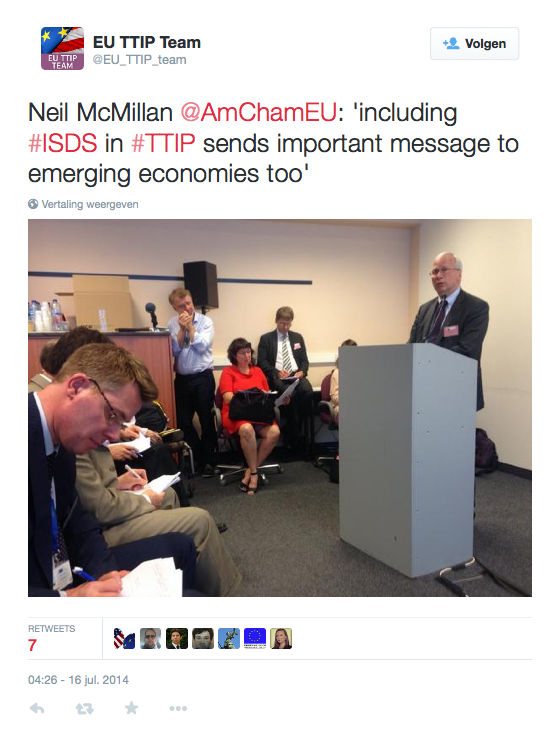
Neil McMillan had various roles within the UK government including Director for EU internal trade policy and Director of Europe for the UK government's Trade Department. His last official position was as Director of the European and Global issues Secretariat at the Cabinet Office where he gave “advice to the Prime Minister on European and global economic affairs … [and] UK coordinator for the Lisbon Competitiveness Agenda” amongst other responsibilities.
He left the UK government in 2008 and has since taken up a variety of corporate roles including head of Nabucco Political Strategy RWE Supply and Trading in Brussels, to run his own consultancy firm Neil McMillan Consult, and to work as an advisor on EU policy for lobby firm Brunswick in Brussels.
At Brunswick he advised “clients on public and government affairs in a wide range of EU policy areas, including energy, telecoms, competition policy and trade”; Brunswick says that McMillan worked with various clients including: BT, the government of Jersey, Hutchison, VISA, Outokumpu, EDF, AT&T, and ICE. Whilst at Brunswick he co-authored an opinion piece on the company's website promoting TTIP which advised “It is … imperative that companies keep abreast of developments and do what they can to ensure the right outcomes.” He left Brunswick in November 2014.
For 18 months to November 2014, he sat on the board of the American Chamber of Commerce in the EU (AmCham EU) and was vice-chair of its trade committee. In this role he spoke at the WTO Public Forum on Trade facilitation from a business perspective – a key growth enabler and at a Commission-organised TTIP stakeholder event to discuss “Next generation of investment protection” where according to a tweet about the event he told the audience “including ISDS in TTIP sends important message to emerging economies too”.
In February 2015, McMillan started working for EuroCommerce (the association for retail, wholesale and international trade interests) as Director of Advocacy and Political Affairs. He is listed in EuroCommerce's lobby register entry as holding a European Parliament access pass (viewed 2 July 215). Since 1 December 2014, EuroCommerce has had no fewer than 26 meetings with the Commission, including one with DG Trade; CEO's data records that between January 2012 and February 2014, EuroCommerce had at least seven encounters with DG Trade on TTIP.
Update: on 15 July, Neil McMillan replied to CEO and his response is available here. He says that "I am not directly responsible for trade policy..." at EuroCommerce and that at Brunswick, "I did no specific work for clients on trade".
Conclusion
As in many other areas of EU public life, the revolving door is spinning smoothly and is helping to grease the wheels of the TTIP lobby. We don't know how big the TTIP revolving door problem is across the EU, but considering the lack of proactive transparency in this area, the cases we have featured here are likely to be only the TTIP of the iceberg. As this report has shown, the rules on revolving doors, lobby transparency and freedom of information all need tightening. CEO considers the following rule changes to be essential.
On the revolving door and conflicts of interest:
- Revolving door rules at the EU level should be substantially upgraded and properly monitored and enforced. Former commissioners and very senior officials should face a three year cooling-off period (ban) on lobby jobs or any other job which provokes the risk of a conflict of interest; other Commission officials and MEPs should face a two year cooling-off period.
- The Commission should be more thorough when appointing special advisers and it should put far stronger safeguards in place to prevent possible conflicts of interests.
- EU member states should upgrade their revolving door rules. This report has shown that UK rules are inadequate and the rules in the Netherlands are non-existent. As Transparency International recently reported: “the risks are high when it comes to the revolving door and … the importance of mitigating them has not been sufficiently recognised by the political leadership in European countries”.
- All public authorities should also be transparent about revolving door moves, especially those affecting the most senior officials. This will help with monitoring and enforcement and would also represent good practice.
On lobby transparency and freedom of information:
- The Commission should extend its policy of pro-actively publishing lists of lobby meetings to include those held by all Commission officials. It should also publish minutes from those meetings. While it is a step forward to now be able to see who commissioners, cabinet members and directors-general meet with, we know that the vast majority of lobby meetings happen within the lower ranks of Commission staff. For that reason, no one in the Commission should meet with lobbyists who are not part of the EU lobby register. The Commission should also publish all policy submissions from third parties in an easy-to-access documents register.
- Further changes are also needed to the EU's lobby transparency regime. The lobby register could and should demand that registrants provide information on their revolving door recruitment ie. any lobbyist who has previously worked for an EU institution in the past three years should be specified. And the register authorities should have far stricter enforcement policies to ensure that lobby work on TTIP is properly reflected in the data provided. Too few organisations specifically mention it. Ultimately, a legally-binding lobby register is required, which would place proper penalties on lobbyists who do not register or who provide inaccurate data. As CEO's data shows, too many organisations lobbying on TTIP are not registered.
- At the EU and member state levels, access to documents and freedom of information rules need to be interpreted more liberally. Too much information including the names of lobbyists and/or officials are redacted from lists or minutes of meetings held on the grounds of data privacy. As the European Ombudsman recently said: “What is not valid is to give a privileged space to certain interests or to shield from public gaze the names of the influencers”. It is not an unreasonable breach of personal privacy to provide the name of lobbyists when they meet with public officials.
Finally, with regards to transparency of the TTIP negotiations themselves:
- The Commission should publish all negotiating positions, all requests and offers, and all consolidated draft negotiation texts prior to each negotiation round, so that the European and national parliaments, as well as civil society organisations and the wider public, can make recommendations on them before the negotiations are closed for comments and the agreement goes to ratification.
- It should also publish detailed agendas of negotiation rounds prior to the negotiations and detailed reports on the rounds after, to keep the public updated on the progress of the negotiations.
- Finally it should publish all submissions from stakeholders made to it in the context of TTIP unless the sender gives good reasons for confidentiality and provides a non-confidential summary for publication.
Researched and written by Vicky Cann, with additional research and writing by Margarida da Silva.
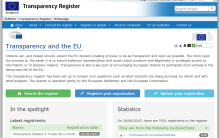 The
The 
Comments
Please make this a clear democratic transparency of choices, & involve less affiliated bodies; the people have a voice so let us all give our opinions, and only then can a free society exist.